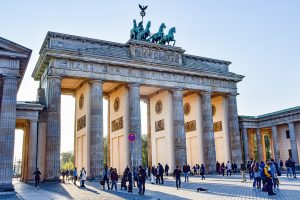Estonia’s – my home of choice – belief in the European Union, the democratic ideals and prosperity it stands for, has not wavered, best exemplified by its very vocal support for Ukrainian accession, writes Alistair Starling.
We may have reached another turning point in the EU’s history. The EU has voted to open accession talks with Moldova and Ukraine. Headed by France and Germany, the EU has long been hesitant to accept new members. The turning point, especially in France and Germany’s view, is Russia’s brutal invasion of Ukraine. The breakthrough came after [Viktor] Orban abstained from the vote, having previously blocked Ukraine’s ambitions to join the EU. Now, while the way seems clear, there is a long path ahead both for the EU and its membership candidates.
As a Brit and having lived across Europe and many years in Germany, I understand the challenges they see. According to the EU’s calculations, under the current Common Agriculture Policy (CAP) Ukraine would receive nearly €97 billion annually and another €61 billion from the Common Cohesion Policy. The Centre for European Policy Studies estimates a contribution increase of 10 percent for current members. Being a large agrarian state, Ukraine nearly doubles France’s arable land mass, the largest in the EU. Its grain products were already mostly sold to the EU – without tariffs these products would flood the market and stir up political resistance. The Polish agriculture minister already signaled in September that he would only allow Ukraine to join with restrictions on its agricultural products. Similarly, with the accession of Ukraine and Moldova a labor force would gain free movement, with the potential to further disrupt our Union already wrestling with a rise of right-wing sceptics. It must not be forgotten that Brexit’s origin was partly rooted in prejudice towards foreign migrant workers.
For a successful accession we must understand these challenges and seek reform. For example, the CAP and other common policies have long been a pain point for net contributor members. Ukraine could inspire a reform of the CAP making it more sustainable and future-proof. I hope that we can use these years to learn from painful mistakes of the past and take a new labor force and grain reserves as potentials to be harnessed in strengthening our Union. Yet, we should not forget that we are not the only ones facing challenges: Ukraine foremost will have to undertake significant change. It must change its institutions, establish a stable rule of law, independent media, improve the rights of minorities and weed out corruption to comply with the EU membership criteria. This will not happen overnight, but so far, I join Kaja Kallas in commending the Ukrainians on the headway they are making, despite a war ravaging their country and encourage them to continue. There is a long way to go, but their recent judiciary reforms make me optimistic. If they hold, then reform is well underway.
Following Brexit, and out of the aftermath of Russia’s vicious invasion, the EU seeks to emerge stronger, more unified. Former NATO Secretary-General and Danish Prime Minister Rasmussen put it quite clearly recently in Politico: “Accepting Ukraine is not an act of charity.” For Estonia it is a necessity – the Estonians were living under the shadow of Putin’s autocratic ambitions long before the invasion, sharing a border and history with Russia. Here, the brutal invasion of Ukraine was the shattering materialization of many people’s worst fears, hence Ukraine’s accession is not just about figures or institutional reform. It is much more a beacon of hope, a reminder of what the European idea is about: solidarity, democracy, prosperity as a Union. The Estonians have rightly concluded that such ideals are worth defending against Putin’s attack – to their credit, earlier and more emphatically than others in our Union. Opening accession negotiations with Ukraine shows a mutual commitment to democracy, a commitment we make to firmly show Putin and his antidemocratic encroachment its limits. Just like 22 years ago, during the EU’s last round of enlargement, we can succeed in consolidating prosperity and peace across Europe.
Alistair Starling, Estonian e-resident, former British diplomat


